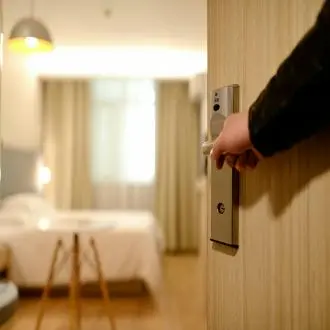Transcription touristandnon-touristaccommodation
Definition and Main Objective of Tourist Accommodation
The concept of tourist accommodation is formally defined as any facility that, regularly or occasionally, provides overnight accommodation for a traveler.
This definition, established by the European Commission, covers a wide range of establishments, but they all share a primary and unifying goal: overall customer satisfaction.
This objective is not limited solely to the period of the stay, but extends to all phases of the guest experience, including before, during and after their visit.
The relationship between the establishment and the customer is contractual and commercial in nature; In exchange for a pre-agreed monetary fee, the accommodation agrees to provide a series of services.
The success of any business in this sector directly depends on its ability to meet and even exceed the expectations generated, turning a simple overnight stay into a memorable experience that encourages loyalty and positive recommendations.
The essence of its business is not just selling a space to sleep, but offering hospitality, comfort and a service that fully justifies the investment made by the client.
Services, Benefits and Infrastructure
The offer of a tourist accommodation is structured in two levels of service.
On the one hand, there are the basic services inherent to the room itself, which include essential elements such as a comfortable bed, a storage space such as a wardrobe and, generally, a private bathroom and a television.
On the other hand, and depending directly on the category and type of establishment, a range of complementary services is deployed designed to enrich the stay of the customer.
These can range from catering options such as restaurants and cafes, to leisure and wellness facilities such as swimming pools, spas, gyms or entertainment services.
The decision to offer certain services, such as catering, may depend on the specific demand of the customer.
In order to operate, all these establishments must meet basic and non-negotiable infrastructure requirements.
It is mandatory to have a constant supply of drinking water, with storage systems, such as tanks, that can guarantee the supply for at least a full day in the event of a cut in the general network.
Equally crucial is to have an adequate system for the treatment and evacuation of wastewater, either through connection to the public sewerage network or through its own purification facilities.
The provision of electricity must be sufficient to cover all the needs of the complex, including emergency lighting systems in outdoor areas such as gardens, entrances and parking.
Finally, if the establishment is located far from an urbanized area, it must guarantee a paved access road, properly signposted and with a minimum width of five meters to ensure the comfort and safety of its guests.
The Concept of Non-Tourist Accommodation
In contrast to tourist establishments, there are other centers that also provide accommodation but whose fundamental purpose is not leisure or travel.
These entities are known as non-tourist accommodations and respond to specific needs of society.
A clear example is hospitals and clinics, places intended to provide health services, diagnose diseases and apply treatments, where patients may remain admitted for variable periods.
Similarly, residences for the elderly are establishments designed to house elderly people who require care or companionship.
Another case is school residences or boarding schools, educational centers that welcome students during the academic year, providing them with accommodation and an environment conducive to study.
Even penitentiary establishments fall into this category, since their function is to house people serving custodial sentences.
Although in all of these places, cleaning and room maintenance tasks are essential, the protocols, priority of tasks, and approach to service differ drastically from those of a hotel.
The priority in a hospital will be asepsis and infection control, while in a nursing home, it will be safety and comfort adapted to the mobility needs of residents.
Summary
A tourist accommodation offers a place for travelers to stay overnight. Its main objective is comprehensive customer satisfaction at all stages of their visit, seeking to create a memorable experience.
The offerings of these establishments include basic room services and complementary services such as swimming pools or restaurants. In addition, they must meet essential infrastructure requirements, such as adequate water and electricity supplies, and access.
In contrast, non-tourist accommodations such as hospitals or nursing homes do not focus on leisure. Although cleanliness is vital, their service protocols and priorities are completely different.
tourist and non tourist accommodations




